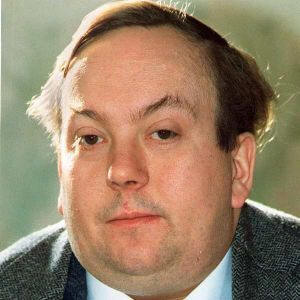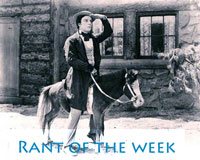There is something about Stefan Kiszko's story,
among many, many stories of wrongful convictions, that is especially
poignant.
The bare bones: on October 5, 1975, Lesley Susan Molseed,
an 11-year-old girl from Manchester, England, was
murdered on Rishworth Moor. She was not sexually assaulted but her
assailant masturbated over her body.
(I don't even know what a Rishworth Moor
is but it sounds dark enough, and drab and dreary.)
The police needed a
suspect.
They never choose a well-spoken,
middle-class, white professional who knows how to get a good lawyer for these things. Virtually never.
(An exception.)
Enter
Stefan Kiszko, 26 years old, a Ukrainian immigrant, with a few strange
habits. He happened to live nearby and awaited disaster. Kiszko lived with his mother and
compulsively wrote down license numbers of cars that annoyed him. One
of these license numbers matched the number on a car seen driving in the
area in which the body was found.
Kizsko suffered from anemia and other medical complications.
He initially came to the attention of the authorities when three teenaged girls went to the police and claimed that Stefan Kiszko had
exposed himself to them. The police picked him up and questioned him
and quickly formed the opinion that this was just the kind of suspect they
were looking for in the unsolved Lesley Molseed case. Take that as you will.
Then they found the license number in his notes-- case closed.
As always-- and, as usual,
without consequence-- the police broke the rules. They questioned him
without advising him that he could have a lawyer present. They did not
inform him that he was a suspect in the Lesley Molseed murder. They
denied his request for his mother to be present. They bullied and
cajoled and intimidated and harassed him for hour after hour after hour and then they told him he could go
home if he would only sign the confession. According to the
Guardian Newspaper, Kiszko had the emotional and mental age of 12.
A smart police officer--- well, let's say, a conscientious police
officer-- would have realized that Kiszko was vulnerable and easily led and
might have looked for something in the confession that
provided independent collaboration of the story. A detail that would
have been unknown to anyone but the perpetrator. No such luck. I
don't know if they even thought of it, but no such evidence was brought
forward.
But that's not the "industry" of policing. The "industry"
of policing is the arrest and conviction of individuals blamed for specific
crimes. Whether or not the individual actually committed crime isn't
always relevant to the "success" or goal of the industry. People
should understand that. There is a reason why the police and
prosecutors are so reluctant to give up on a prosecution even when there is
overwhelming evidence of innocence.
As someone who is not in that
industry, I think about that a lot. If I had been a cop, the first
thing I would have wanted out of Kiszko, if he was going to confess, is
something we didn't already know. A type of knot. A weapon.
An artifact. The position of the hands on the body. Anything.
I think I would have been troubled if there was nothing like that in his
confession.
Maybe a
cop thinks that no one would ever confess to a crime he did not commit. [Be it
noted that Albert DeSalvo-- the Boston Strangler-- "confessed", and
allegedly provided the police with details "only the murderer could have
known"; DNA testing proved that his confession was false. One can only
conclude that the information only the murderer could have known was probably
actually provided to him by the police.] I don't find it so
unbelievable. The psychological pressure on a suspect must be
unbelievable. It must be like someone constantly poking at you with a
pointed stick, jabbing you again and again, stopping for a moment, then
starting again just as you begin to relax. And it will all
end if you only please please please sign this piece of paper.
Kiszko was tried in July 1976. As usual
in cases of wrongful conviction, his lawyer appears
to have been incompetent. (Where's the Hollywood Movie about this
lawyer?) In fact, in express contradiction of Kiszko's
wishes, his lawyer made a defense of "diminished responsibility".
He
didn't do it, but if he had, he wasn't responsible. Needless to say,
this strategy undermined Kiszko's alibi (that he was with his aunt at the
time, and then in a store). His lawyer also failed to provide the court with evidence
about Kiszko's medical condition (a condition which made it unlikely he could have
carried the body to where it was found) or, astonishingly, that his semen did not
contain any sperm (sperm was found in the semen found on Lesley Molseed's
body).
That last fact alone should have disqualified Kiszko from suspiciion.
The prosecution apparently knew these facts and failed to provide
them to the defense, as they are required to do.
Philip Clegg, an attorney who assisted on the case, later admitted he had
doubts about the confession and Kiszko's guilt at the time. Bravo for
you Clegg.
The jury must have respected the police an awful lot because they didn't see
any flaws in the case and voted 10-2 for conviction (in Britain, the jury
need not be unanimous). Did they think the evidence looked thin
but the police probably had stuff they couldn't show in court?
Awards, medals, and court appointments for all
concerned!
A life sentence for Kiszko.
"We can find no grounds
whatsoever to condemn the jury's verdict of murder as in any way unsafe or
unsatisfactory". Lord Justice Bridge, on appeal.
After five
years in prison, and innumerable threats from other prisoners, and several vicious beatings, Kiszko began to show signs of
mental deterioration and schizophrenia.
He was denied parole
because he continued to claim he was innocent. In fact, he was
diagnosed as delusional precisely because he claimed he was innocent.
All the same, he was denied effective treatment and was shuttled around from
prison to prison, hospital to hospital, until he was pretty well destroyed
as a human being.
Until he was pretty much destroyed as a human being.
Around 1987, a gentleman named Campbell Malone took an
interest in the case, at Kiszko's mother's urging, and began to examine the
evidence. It seems to take a long, long time to "examine
evidence". Years continue to go by. Kiszko sits deteriorating in
prison and years and years go by.
But meantime... Kiszko's very own lawyer,
David Waddington, had become Home Secretary. He would soon be
appointed to the House of Lords! David Waddington, you see, was pro
capital punishment!
It didn't take all that much work, really. With
the help of a private detective, -- why do years go by??-- Campbell Malone
was able to determine that strong alibis existed for Kiszko, that he was
incapable of leaving sperm on the crime scene, and, most astonishingly, the
three girls who saw him exposing himself had lied.
They did it, they said, "for a laugh".
The Yorkshire Police and the forensic
scientists involved in the conviction never apologized. Judge Lane
apologized but didn't think he'd do anything differently the next time.
In
November 1992, Kiszko, emotionally and psychologically destroyed went home.
He became a recluse. He was promised 500,000 pounds compensation but
never received it. One year later, he died of a massive heart
attack
In one of the few acts of true grace in this sad, sad story--as
all the police and prosecutors blamed each other and insisted they were all good
and wise and just-- Lesley Susan Molseed's sister had the
remarkable good grace to attend Kiszko's
funeral in acknowledgement of his innocence: Kiszko, it turns out, was just another victim.
In October
2006, a man named Ronald Castree was arrested and charged with raping and
beating a prostitute. A DNA test proved he was innocent.
Ironically, it then proved a match to another specimen -- in November 2006, Castree was arrested and charged with Lesley Molseed's murder.
His DNA matched that of the semen found on the body.
I am so pleased that today we have finally put things right."
Police Superintendent Max Maclean.
And that is quite possibly the most obscene statement of all. "We
have finally put things right". Police Superintendent Max Maclean, you
are a fucking liar.
No, you haven't. You never will. It's simply
not possible anymore.
Not until the little girls have had all their
laughs.
* In the U.S., assuming Kiszko had been executed-- a likely event-- , no one would ever have
found out he was innocent because no court action can be brought on behalf
of a deceased prisoner.



